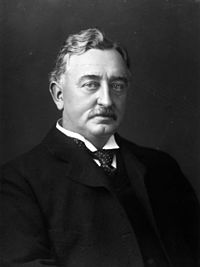Cecil Rhodes
Cecil Rhodes (5 July 1853 - 26 March 1902) was an English-born South African businessman and politician. He was the son of an Anglican vicar. He came from an English grammar school and at the age of 16 was sent to the British colony of Natal in South Africa due to poor health. There he became involved in diamond mining and founded the world-renowned De Beers diamond company.
He later returned to England briefly to study at Oriel College, Oxford. He was the starter of Rhodesia. He started the British South Africa Company. He led it to expand British territory to the north and form the colony of Rhodesia.
When he was 27, he entered parliament, in 1881. He became Prime Minister of Cape Colony from 1890 to 1896. He was supported by the Afrikaner Bond in the Cape Colony until he betrayed them by supporting a rebellion against their relatives, the Boers of the South African Republic. He set up the Jameson Raid, led by his close friend Leander Starr Jameson in 1895. The raid was an unauthorised attack on Paul Kruger's South African Republic (or Transvaal). After that the Bond forced him to resign. His heart was weak, and after years of ill health he died in 1902. He was buried in what is now Zimbabwe; his grave has been a controversial site.
He supported the Liberal Party and the Irish Parliamentary Party in domestic politics, in the UK.
He started the Rhodes scholarships in his will. They let citizens of British colonies, the United States and Germany to study at Oxford on a scholarship if they demonstrated certain academic and character qualities. He was a Freemason. The scholarship has benefited prime ministers of Malta, Australia and Canada, United States President Bill Clinton, and many others.[1]
When he was prime minister, Rhodes used his political power to take land from black Africans through the Glen Grey Act. To be able to vote, people needed to have a certain amount of money. In the Franchise and Ballot Act, he tripled that sum. This effectively barred black people from taking part in elections.[2][3]
Many scholars think that he was a white supremacist. In his last years he was pursued by the Princess Catherine Radziwill, a Polish adventuress.
With the strengthening of international movements against racism, such as Rhodes Must Fall and Black Lives Matter, Rhodes' legacy is a matter of debate to this day.[4] Critics cite his confiscation of land from the black indigenous population of the Cape Colony, and false claims that southern African archeological sites such as Great Zimbabwe were built by European civilisations.[5][6]
Cecil Rhodes Media
Rhodes' birthplace, now part of Bishop's Stortford Museum; the bedroom in which he was born is marked by a plaque.
A portrait bust of Rhodes on the first floor of No. 6 King Edward Street marks the place of his residence whilst in Oxford.
Sketch of Rhodes by Violet Manners
Cecil Rhodes (Sketch by Mortimer Menpes)
"The Rhodes Colossus" – a cartoon by Edward Linley Sambourne, published in Punch after Rhodes announced plans for a telegraph line from Cape Town to Cairo in 1892.
References
- ↑ Koutonin, Mawuna (2016-08-18). "Lost cities #9: racism and ruins – the plundering of Great Zimbabwe". the Guardian. Retrieved 2022-03-13.
- ↑ Dowden, Richard (17 April 1994). "Apartheid: made in Britain: Richard Dowden explains how Churchill, Rhodes and Smuts caused black South Africans to lose their rights". The Independent (London). https://www.independent.co.uk/voices/apartheid-made-in-britain-richard-dowden-explains-how-churchill-rhodes-and-smuts-caused-black-south-1370856.html. Retrieved 15 January 2016.
- ↑ History of South Africa Timeline (1485–1975) Archived 13 September 2011 at the Wayback Machine
- ↑ Maylam, Paul (14 January 2016). "What Cecil John Rhodes said in his will about who should get scholarships". The Conversation. Retrieved 2022-03-13.
- ↑ "'Colonialism had never really ended': my life in the shadow of Cecil Rhodes". the Guardian. 2021-01-14. Retrieved 2022-03-13.
- ↑ "Cecil Rhodes was a racist, but you can't readily expunge him from history | Will Hutton". the Guardian. 2015-12-20. Retrieved 2022-03-13.
